- Home
- Lord Dunsany
Gods, Men and Ghosts Page 7
Gods, Men and Ghosts Read online
Page 7
They came in silence to the foot of the stairs; and then it befell that as they drew near safety, in the night’s most secret hour, some hand in an upper chamber lit a shocking light, lit it and made no sound.
For a moment it might have been an ordinary light, fatal as even that could very well be at such a moment as this; but when it began to follow them like an eye and to grow redder and redder as it watched them, then even optimism despaired.
And Sippy very unwisely attempted flight, and Slorg even as unwisely tried to hide; but Slith, knowing well why that light was lit in that secret upper chamber and who it was that lit it, leaped over the edge of the World and is falling from us still through the unreverberate blackness of the abyss.
The Coronation of Mr. Thomas Shap
IT was the occupation of Mr. Thomas Shap to persuade customers that the goods were genuine and of an excellent quality, and that as regards the price their unspoken will was consulted. And in order to carry on this occupation he went by train very early every morning some few miles nearer to the City from the suburb in which he slept. This was the use to which he put his life.
From the moment when he first perceived (not as one reads a thing in a book, but as truths are revealed to one’s instinct) the very beastliness of his occupation, and of the house that he slept in, its shape, make and pretensions, and of even the clothes that he wore; from that moment he withdrew his dreams from it, his fancies, his ambitions, everything in fact except that ponderable Mr. Shap that dressed in a frock-coat, bought tickets and handled money and could in turn be handled by the statistician. The priest’s share in Mr. Shap, the share of the poet, never caught the early train to the City at all.
He used to take little flights with his fancy at first, dwelt all day in his dreamy way on fields and rivers lying in the sunlight where it strikes the world more brilliantly further South. And then he began to imagine butterflies there; after that, silken people and the temples they built to their gods.
They noticed that he was silent, and even absent at times, but they found no fault with his behaviour with customers, to whom he remained as plausible as of old. So he dreamed for a year, and his fancy gained strength as he dreamed. He still read halfpenny papers in the train, still discussed the passing day’s ephemeral topic, still voted at elections, though he no longer did these things with the whole Shap—his soul was no longer in them.
He had had a pleasant year, his imagination was all new to him still, and it had often discovered beautiful things away where it went, south-east at the edge of the twilight. And he had a matter-of-fact and logical mind, so that he often said, “Why should I pay my twopence at the electric theatre when I can see all sorts of things quite easily without?” Whatever he did was logical before anything else, and those that knew him always spoke of Shap as “a sound, sane, level-headed man.”
On far the most important day of his life he went as usual to town by the early train to sell plausible articles to customers, while the spiritual Shap roamed off to fanciful lands. As he walked from the station, dreamy but wide awake, it suddenly struck him that the real Shap was not the one walking to Business in black and ugly clothes, but he who roamed along a jungle’s edge near the ramparts of an old and Eastern city that rose up sheer from the sand, and against which the desert lapped with one eternal wave. He used to fancy the name of that city was Larkar. “After all, the fancy is as real as the body,” he said with perfect logic. It was a dangerous theory.
For that other life that he led he realized, as in Business, the importance and value of method. He did not let his fancy roam too far until it perfectly knew its first surroundings. Particularly he avoided the jungle—he was not afraid to meet a tiger there (after all it was not real), but stranger things might crouch there. Slowly he built up Larkar: rampart by rampart, towers for archers, gateway of brass, and all. And then one day he argued, and quite rightly, that all the silk-clad people in its streets, their camels, their wares that came from Inkustahn, the city itself, were all the things of his will—and then he made himself King. He smiled after that when people did not raise their hats to him in the street, as he walked from the station to Business; but he was sufficiently practical to recognize that it was better not to talk of this to those that only knew him as Mr. Shap.
Now that he was King in the city of Larkar and in all the desert that lay to the East and North he sent his fancy to wander further afield. He took the regiments of his camel-guard and went jingling out of Larkar, with little silver bells under the camels’ chins, and came to other cities far-off on the yellow sand, with clear white walls and towers, uplifting themselves in the sun. Through their gates he passed with his three silken regiments, the light-blue regiment of the camel-guard being upon his right and the green regiment riding at his left, the lilac regiment going on before. When he had gone through the streets of any city and observed the ways of its people, and had seen the way that the sunlight struck its towers, he would proclaim himself King there, and then ride on in fancy. So he passed from city to city and from land to land. Clear-sighted though Mr. Shap was, I think he overlooked the lust of aggrandizement to which kings have so often been victims: and so it was that when the first few cities had opened their gleaming gates and he saw peoples prostrate before his camel, and spearmen cheering along countless balconies, and priests come out to do him reverence, he that had never had even the lowliest authority in the familiar world became unwisely insatiate. He let his fancy ride at inordinate speed, he forsook method, scarce was he king of a land but he yearned to extend his borders; so he journeyed deeper and deeper into the wholly unknown. The concentration that he gave to this inordinate progress through countries of which history is ignorant and cities so fantastic in their bulwarks that, though their inhabitants were human, yet the foe that they feared seemed something less or more; the amazement with which he beheld gates and towers unknown even to art, and furtive people thronging intricate ways to acclaim him as their sovereign; all these things began to affect his capacity for Business. He knew as well as any that his fancy could not rule these beautiful lands unless that other Shap, however unimportant, were well sheltered and fed: and shelter and food meant money, and money, Business. His was more like the mistake of some gambler with cunning schemes who overlooks human greed. One day his fancy, riding in the morning, came to a city gorgeous as the sunrise, in whose opalescent wall were gates of gold, so huge that a river poured between the bars, floating in, when the gates were opened, large galleons under sail. Thence there came dancing out a company with instruments, and made a melody all round the wall; that morning Mr. Shap, the bodily Shap in London, forgot the train to town.
Until a year ago he had never imagined at all; it is not to be wondered at that all these things now newly seen by his fancy should play tricks at first with the memory of even so sane a man. He gave up reading the papers altogether, he lost all interest in politics, he cared less and less for things that were going on around him. This unfortunate missing of the morning train even occurred again, and the firm spoke to him severely about it. But he had his consolation. Were not Aráthrion and Argun Zeerith and all the level coasts of Oora his? And even as the firm found fault with him his fancy watched the yaks on weary journeys, slow specks against the snow-fields, bringing tribute; and saw the green eyes of the mountain men who had looked at him strangely in the city of Nith when he had entered it by the desert door. Yet his logic did not forsake him; he knew well that his strange subjects did not exist, but he was prouder of having created them with his brain, than merely of ruling them only; thus in his pride he felt himself something more great than a king, he did not dare to think what! He went into the temple of the city of Zorra and stood some time there alone: all the priests kneeled to him when he came away.
The Coronation of Mr. Thomas Shap
“Little Cottages... Whose Looks We Did Not Like” (from “Poor Old Bill”)
He cared less and less for the things we care about, for the affairs of
Shap, a business-man in London. He began to despise the man with a royal contempt.
One day when he sat in Sowla, the city of the Thuls, throned on one amethyst, he decided, and it was proclaimed on the moment by silver trumpets all along the land, that he would be crowned as king over all the lands of Wonder.
By that old temple where the Thuls were worshipped, year in, year out, for over a thousand years, they pitched pavilions in the open air. The trees that blew there threw out radiant scents unknown in any countries that know the map; the stars blazed fiercely for that famous occasion. A fountain hurled up, clattering, ceaselessly into the air armfuls on armfuls of diamonds, a deep hush waited for the golden trumpets, the holy coronation night was come. At the top of those old, worn steps, going down we know not whither, stood the king in the emerald-and-amethyst cloak, the ancient garb of the Thuls; beside him lay that Sphinx that for the last few weeks had advised him in his affairs.
Slowly, with music when the trumpets sounded, came up towards him from we know not where, one-hundred-and-twenty archbishops, twenty angels and two archangels, with that terrific crown, the diadem of the Thuls. They knew as they came up to him that promotion awaited them all because of this night’s work. Silent, majestic, the king awaited them.
The doctors downstairs were sitting over their supper, the warders softly slipped from room to room, and when in that cosy dormitory of Hanwell they saw the king still standing erect and royal, his face resolute, they came up to him and addressed him: “Go to bed,” they said—“pretty bed.” So he lay down and soon was fast asleep: the great day was over.
Poor Old Bill
ON an antique haunt of sailors, a tavern of the sea, the light of day was fading. For several evenings I had frequented this place, in the hope of hearing something from the sailors, as they sat over strange wines, about a rumour that had reached my ears of a certain fleet of galleons of old Spain still said to be afloat in the South Seas in some uncharted region.
In this I was again to be disappointed. Talk was low and seldom, and I was about to leave, when a sailor, wearing earrings of pure gold, lifted up his head from his wine, and looking straight before him at the wall, told his tale loudly:
(When later on a storm of rain arose and thundered on the tavern’s leaded panes, he raised his voice without effort and spoke on still. The darker it got the clearer his wild eyes shone.)
“A ship with sails of the olden time was nearing fantastic isles. We had never seen such isles.
“We all hated the captain, and he hated us. He hated us all alike, there was no favouritism about him. And he never would talk a word with any of us, except sometimes in the evening when it was getting dark he would stop and look up and talk a bit to the men he had hanged at the yard-arm.
“We were a mutinous crew. But Captain was the only man that had pistols. He slept with one under his pillow and kept one close beside him. There was a nasty look about the isles. They were small and flat as though they had come up only recently from the sea, and they had no sand or rocks like honest isles, but green grass down to the water. And there were little cottages there whose looks we did not like. Their thatches came almost down to the ground, and were strangely turned up at the corners, and under the low eaves were queer, dark windows whose little leaded panes were too thick to see through. And no one, man or beast, was walking about, so that you could not know what kind of people lived there. But Captain knew. And he went ashore and into one of the cottages, and someone lit lights inside, and the little windows wore an evil look.
“It was quite dark when he came aboard again, and he bade a cheery good-night to the men that swung from the yard-arm, and he eyed us in a way that frightened poor old Bill.
“Next night we found that he had learned to curse, for he came on a lot of us asleep in our bunks, and among them poor old Bill, and he pointed at us with a finger, and made a curse that our souls should stay all night at the top of the masts. And suddenly there was the soul of poor old Bill sitting like a monkey at the top of the mast, and looking at the stars, and freezing through and through.
“We got up a little mutiny after that, but Captain comes up and points with his finger again, and this time poor old Bill and all the rest are swimming behind the ship through the cold, green water, though their bodies remain on deck.
“It was the cabin-boy who found out that Captain couldn’t curse when he was drunk, though he could shoot as well at one time as another.
“After that it was only a matter of waiting, and of losing two men when the time came. Some of us were murderous fellows, and wanted to kill Captain, but poor old Bill was for finding a bit of an island, out of the track of ships, and leaving him there with his share of our year’s provisions. And everybody listened to poor old Bill, and we decided to maroon Captain as soon as we caught him when he couldn’t curse.
“It was three whole days before Captain got drunk again, and poor old Bill and all had a dreadful time, for Captain invented new curses every day, and wherever he pointed his finger our souls had to go; and the fishes got to know us, and so did the stars, and none of them pitied us when we froze on the masts or were hurried through forests of seaweed and lost our way—both stars and fishes went about their businesses with cold, unastonished eyes. Once when the sun had set and it was twilight, and the moon was showing clearer and clearer in the sky, and we stopped our work for a moment because Captain seemed to be looking away from us at the colours in the sky, he suddenly turned and sent our souls to the Moon. And it was colder there than ice at night; and there were horrible mountains making shadows; and it was all as silent as miles of tombs; and Earth was shining up in the sky as big as the blade of a scythe, and we all got homesick for it, but could not speak nor cry. It was quite dark when we got back, and we were very respectful to Captain all the next day, but he cursed several of us again very soon. What we all feared most was that he would curse our souls to Hell, and none of us mentioned Hell above a whisper for fear that it should remind him. But on the third evening the cabin-boy came and told us that Captain was drunk. And we all went to his cabin, and we found him lying there across his bunk, and he shot as he had never shot before; but he had no more than the two pistols, and he would only have killed two men if he hadn’t caught Joe over the head with the end of one of his pistols. And then we tied him up. And poor old Bill put the rum between Captain’s teeth, and kept him drunk for two days, so that he could not curse, till we found a convenient rock. And before sunset of the second day we found a nice bare island for Captain, out of the track of ships, about a hundred yards long and about eighty wide; and we rowed him along to it in a little boat, and gave him provisions for a year, the same as we had ourselves, because poor old Bill wanted to be fair. And we left him sitting comfortable with his back to a rock singing a sailor’s song.
“When we could no longer hear Captain singing we all grew very cheerful and made a banquet out of our year’s provisions, as we all hoped to be home again in under three weeks. We had three great banquets every day for a week—every man had more than he could eat, and what was left over we threw on the floor like gentlemen. And then one day, as we saw San Huëlgédos, and wanted to sail in to spend our money, the wind changed round from behind us and beat us out to sea. There was no tacking against it, and no getting into the harbour, though other ships sailed by us and anchored there. Sometimes a dead calm would fall on us, while fishing boats all around us flew before half a gale, and sometimes the wind would beat us out to sea when nothing else was moving. All day we tried, and at night we laid to and tried again next day. And all the sailors of the other ships were spending their money in San Huëlgédos and we could not come nigh it. Then we spoke horrible things against the wind and against San Huëlgédos, and sailed away.
“It was just the same at Norenna.
“We kept close together now and talked in low voices. Suddenly poor old Bill grew frightened. As we went all along the Siractic coast-line, we tried again and again, and the wind was w
aiting for us in every harbour and sent us out to sea. Even the little islands would not have us. And then we knew that there was no landing yet for poor old Bill, and every one upbraided his kind heart that had made them maroon Captain on a rock, so as not to have his blood upon their heads. There was nothing to do but to drift about the seas. There were no banquets now, because we feared that Captain might live his year and keep us out to sea.
“At first we used to hail all passing ships, and used to try to board them in the boats; but there was no rowing against Captain’s curse, and we had to give that up. So we played cards for a year in Captain’s cabin, night and day, storm and fine, and every one promised to pay poor old Bill when we got ashore.
“It was horrible to us to think what a frugal man Captain really was, he that used to get drunk every other day whenever he was at sea, and here he was still alive, and sober, too, for his curse still kept us out of every port, and our provisions were gone.
“Well, it came to drawing lots, and Jim was the unlucky one. Jim only kept us about three days, and then we drew lots again, and this time it was George. George didn’t keep us any longer, and we drew again, and this time it was Charlie, and still Captain was alive.
“As we got fewer one of us kept us longer. Longer and longer a mate used to last us, and we all wondered how ever Captain did it. It was five weeks over the year when we drew Mike, and he kept us for a week, and Captain was still alive. We wondered he didn’t get tired of the same old curse; but we supposed things looked different when one is alone on an island.
“When there was only Jakes and poor old Bill and the cabin-boy and Dick, we didn’t draw any longer. We said that the cabin-boy had had all the luck, and he mustn’t expect any more. Then poor old Bill was alone with Jakes and Dick, and Captain was still alive. When there was no more boy, and the Captain still alive, Dick, who was a huge, strong man like poor old Bill, said that it was Jakes’ turn, and he was very lucky to have lived as long as he had. But poor old Bill talked it all over with Jakes, and they thought it better that Dick should take his turn.

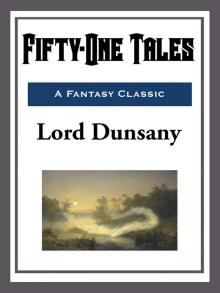 Fifty-One Tales
Fifty-One Tales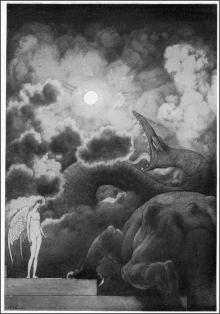 Time and the Gods
Time and the Gods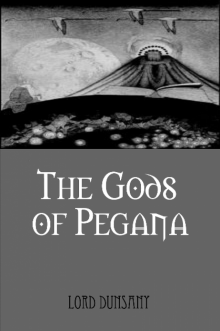 The Gods of Pegana
The Gods of Pegana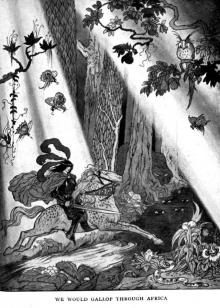 A Dreamer's Tales
A Dreamer's Tales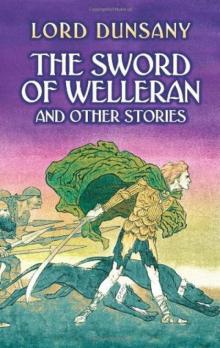 The Sword of Welleran and Other Stories
The Sword of Welleran and Other Stories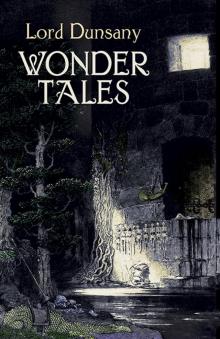 Tales of Wonder
Tales of Wonder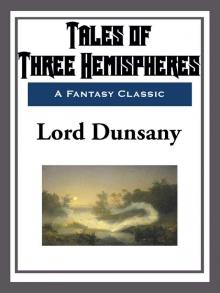 Tales of Three Hemispheres
Tales of Three Hemispheres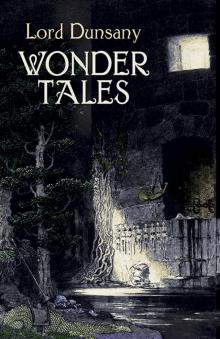 The Book of Wonder
The Book of Wonder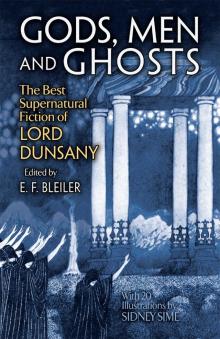 Gods, Men and Ghosts
Gods, Men and Ghosts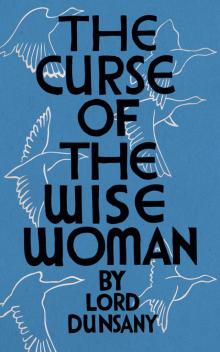 The Curse of the Wise Woman
The Curse of the Wise Woman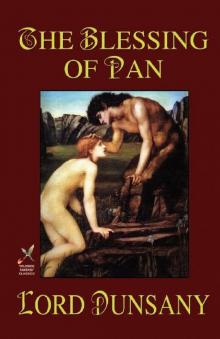 The Blessing of Pan
The Blessing of Pan In the Land of Time
In the Land of Time